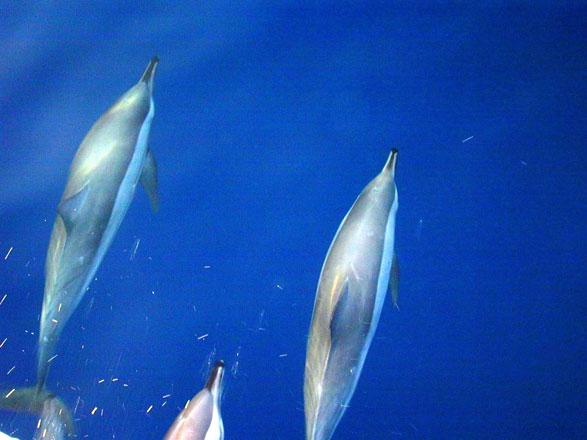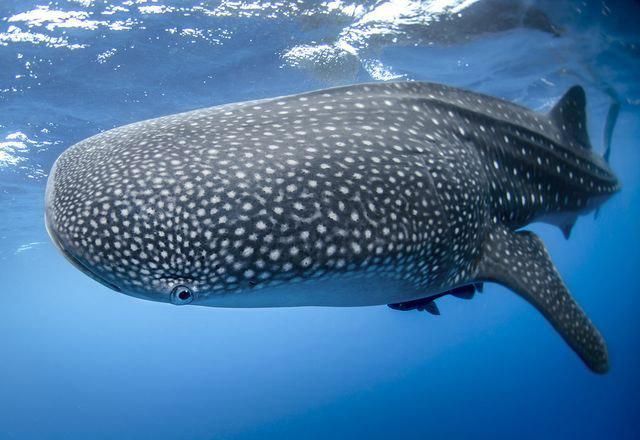You are here
Dolphins, whales frolic in quiet Aqaba waters amid lockdown
By Bahaa Al Deen Al Nawas - Jun 13,2020 - Last updated at Jun 13,2020

Dolphins are pictured swimming in Aqaba waters in this recent photo shared with The Jordan Times (Photo courtesy of Ehab Eid)
AMMAN — More than two-and-a-half months of the coronavirus-induced lockdown has helped marine creatures to reclaim their space in the ecosystem, with recent videos posted on social media sites purportedly showing dozens of whale sharks and dolphins “exceptionally close” to beaches and boats.
Whale sharks and a boat racing with dolphins were seen in a video posted by fisherman Marwan Shreim on his Facebook page. The videos were also shared on the Royal Marine Conservation Society of Jordan (JREDS) page.
In the first video, shared at the end of May, a whale shark is seen swimming alongside Shreim’s boat, while the second video, shared on June 4, shows dolphins racing and jumping alongside his boat.
The Jordan Times contacted Shreim over the phone and he said that dolphins, whale sharks and other marine species are usually present near the coast between May and July.
Shreim has been taking videos and photos of marine life over the past few years, but this year, many people have noticed the videos and the dolphins more than before due to Aqaba’s calmer atmosphere amid the pandemic, he said.
“This is the dolphin season, and they are usually present in the governorate around this time, but the current lack of boat movement has provided them with a sense of security, which has allowed them to move closer to beaches and even perform for the people near them as they dance and race with boats,” the honorary head of the Fishermen Association in Aqaba, Mohammad Al Moghrabi, told The Jordan Times on Wednesday over the phone.
“This year, the large amount of rainfall contributed to washing silt down to beaches, and it is basically fish food that went into the sea. It has helped make the scene exceptional this year as more sea creatures were attracted to beaches in a noticeable way,” Moghrabi said.
He noted that dolphins and whale sharks alike are “very safe” for people to be around, especially since whale sharks eat small fish and plankton.
Moghrabi added that their presence each summer helps attract tourists to the governorate, as they bring “an added-value to what the tourism industry has to offer in Aqaba”.
The Gulf of Aqaba is Jordan’s only marine outlet and extends for 27 kilometres, expert in biodiversity and protected areas Ehab Eid told The Jordan Times.
Aqaba is considered a destination for tourism and a diving hub “due to its clear water”, Eid said.
Aqaba hosts “an extraordinary marine diversity” within major ecosystems such as the 13 coral reefs, sea grasses and sandy bottoms, with more than 500 species of fish, 50 per cent of which inhabit the coral reefs ecosystem, according to the expert.
He added that 157 hard corals, over 100 soft corals, three marine turtles, three types of sea grasses and thousands of invertebrate species have also been reported in Aqaba.
“One of the remarkable annual visitors to Aqaba waters is the whale shark. Residents of Aqaba call it Batan, and this frequent visitor is harmless in spite of its size, which can reach more than 12 metres in length,” he said, noting that it is a filter feeder that almost exclusively eats plankton and small fishes.
“Divers and snorkellers enjoy and welcome this species with pleasure,” Eid said, noting that dolphins can be spotted in Aqaba’s waters in the pelagic zone and “visitors can enjoy observing dolphins leaping above the water surface”.
Related Articles
By Kelly MacnamaraAgence France-PressePLYMOUTH, United Kingdom — The strange metal box hauled from the waves and onto the ship’s deck looks
AMMAN — The Royal Marine Conservation Society of Jordan (JREDS) on Saturday called on authorities to open an investigation into the killing
One to two square kilometres of Aqaba’s public beaches are lost every year to investment projects, according to marine conservationists.


















